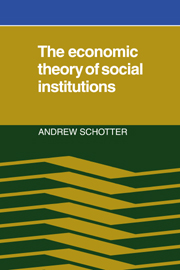Book contents
2 - State-of-nature theory and the rise of social institutions
Published online by Cambridge University Press: 05 November 2011
Summary
If, as we have indicated in Chapter 1, economics is going to study the rise and evolution of social institutions, a very simple methodological approach is suggested. We should start our analyses in a Lockean state of nature in which there are no social institutions at all, only agents, their preferences, and the technology they have at their disposal to transform inputs into outputs. The next step would be to study when, during the evolution of this economy, such institutions as money, banks, property rights, competitive markets, insurance contracts, and the state would evolve. Looking at economics this way has distinct pedagogical advantages, because it allows us to connect a highly abstract economic theory with the world as we view it through the institutions we observe in everyday life.
The type of method suggested in this chapter is not new. In political science, theorists have tried to deal with the evolution of the state as a “social contract” among free individuals and, as a result, have depicted the institution of the state as emerging from a state of nature. Recently, Robert Nozick (1975) has used such a state-of-nature approach to study how the state can arise in a noncoercive way or at least in a manner that is consistent with individual liberties. He is, as a matter of fact, convinced that we can learn a great deal about such social institutions as the state by understanding how the institutions could have evolved that way.
- Type
- Chapter
- Information
- The Economic Theory of Social Institutions , pp. 20 - 51Publisher: Cambridge University PressPrint publication year: 1981
- 1
- Cited by



